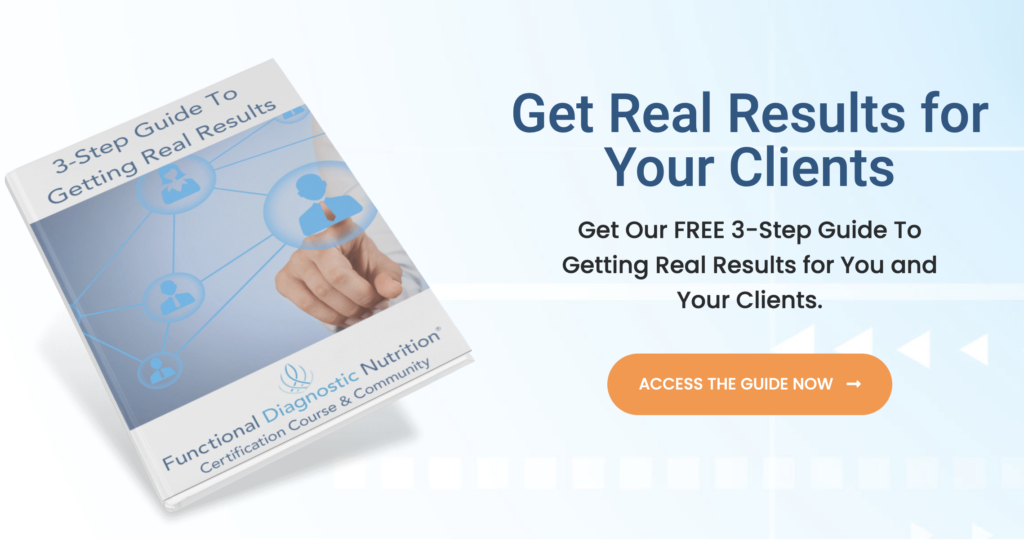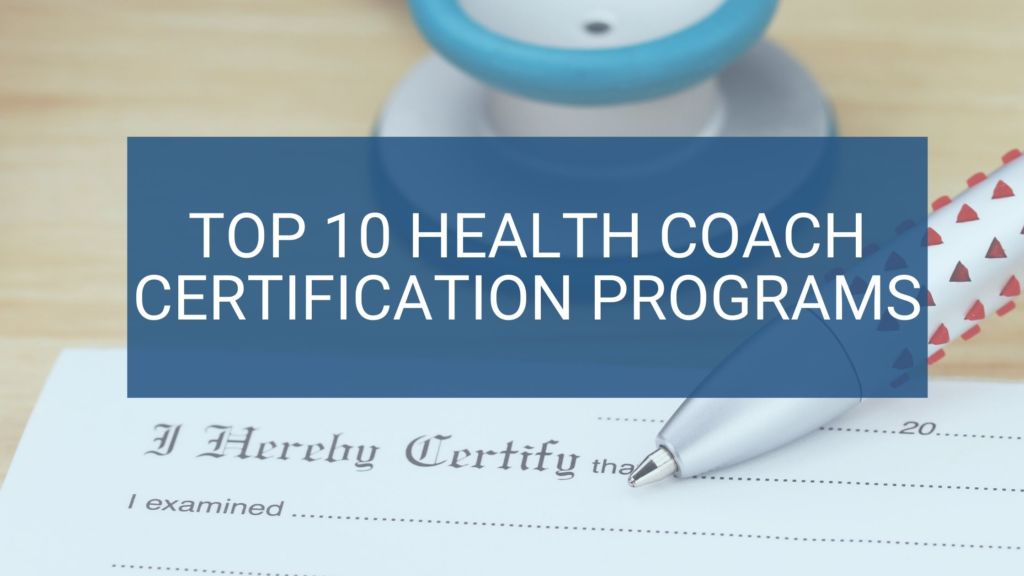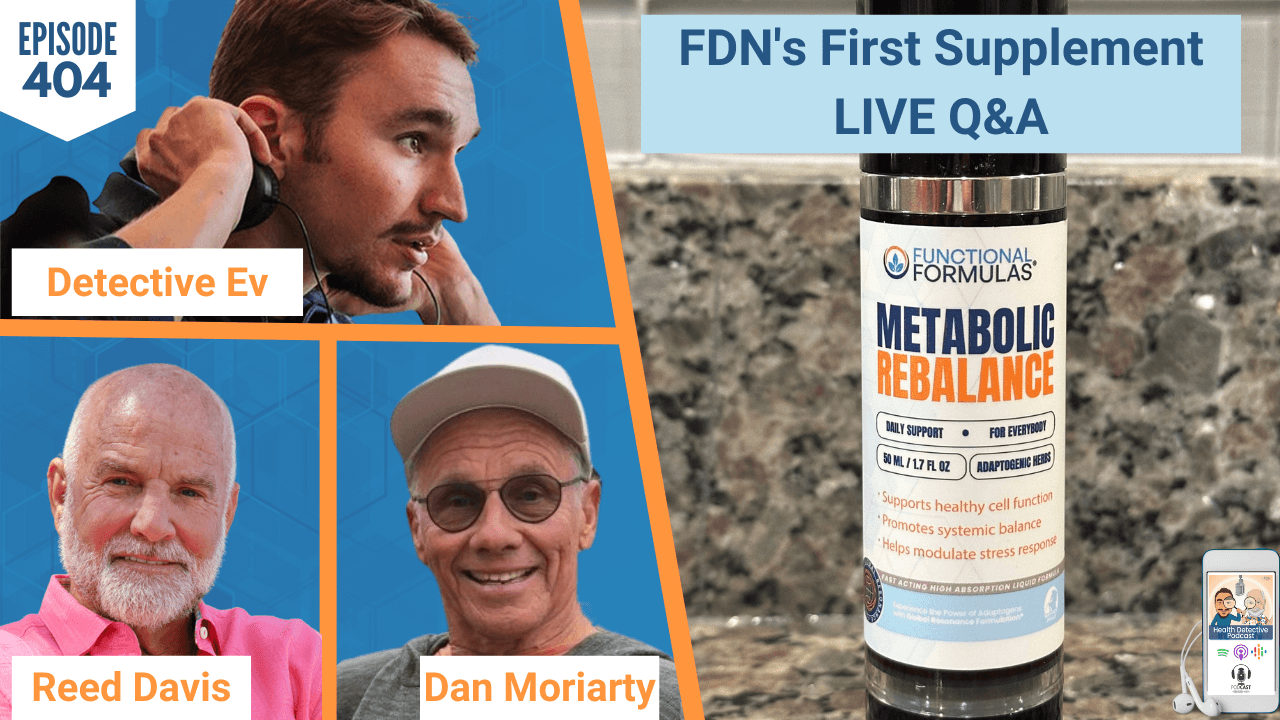If you have decided to become a health coach, you likely know there are a variety of health coach certification programs to choose from. Searching for the right course for you can be time-consuming, overwhelming and confusing. How do you know which one is right for you?

To help you sift through the information and figure out which course is right for you, here is a list of the “top ten” health coach certification programs in alphabetical order.
This list is based on information collected from online forums, social media, and what’s emerging in popularity within the industry.
The information below has been gleaned from those sources, each program’s website, and by talking to students and graduates.

ACE (American Council on Exercise)
There are two options available for the ACE Health Coach Certification: Standard and Premium. Both include an exam voucher and a variety of study materials to help the candidate prepare for the ACE Health Coach Certification Exam.
As stated on the ACE website, in order to sit the ACE Health Coach Certification Exam, candidates must be at least 18 years old and hold a current CPR/AED certification with a live skills check. In addition, they must have one of the following: (a) current NCCA-accredited certification or license in fitness, nutrition, health care, wellness, human resources or a related field; (b) an associate’s degree or higher from an accredited college or university in fitness, exercise science, nutrition, health care, wellness, human resources, or a related field; or (c) at least two years of work experience in any of the industries specified above.
The ACE Health Coach Manual is the core study material for the exam. It includes instruction on coaching clients through nutrition and fitness behavior change and exercise training. It also includes up-to-date statistics from the Centers for Disease Control & Prevention and the American College of Sports Medicine. Candidates are given access to the ACE Resource Center, an exam review, and online practice tests (one in the Standard program and two in the Premium). Included in the Standard program, is a 12‑week guided email series. Included in the Premium program are presentations on the topics covered in the exam as well as a Master the Manual text, with chapter-by-chapter outlines, assignments and quizzes to test comprehension and reinforce key concepts.
Reviews for the ACE Health Coach Certification programs are positive, with graduates reporting they are happy with their certification. Graduates praise the study materials, commenting on them being well written. Also liked is the focus on the psychology of weight management and the providing of techniques to ensure a client can self-manage and take ownership of their program.

CHEK Institute
The CHEK Holistic Lifestyle Coach (HLC) program is a three-level training program. According to the CHEK website, HLC 1 is open to anyone and can either be taken 100% online or as a 3-day live course. HLC 2 is a 5-day live course; HLC 3, a 6-day live course.
As explained on the CHEK Institute website, in HLC 1, students get to work on themselves so that they can be an example to their clients. Students learn how to developing long-term body-mind changes, how to assess physiological load, and how to make essential diet and lifestyle changes. Students are also taught how to use movement to “create energy” as well as how and when to use the “less is more” principle of exercise prescription. Also covered is how to identify common roadblocks to success with diet and lifestyle modifications, and how to implement key concepts of individualized eating.
Once the student has passed the HLC 1 online exam, plus completed some required readings and audio programs, they are eligible to enroll in HLC 2. Level 2 builds upon the foundations learned in HLC 1, teaching the student how to apply what was learned with their clients. In addition to learning coaching techniques for long-term lifestyle changes, students learn the rationale behind physical and metaphysical assessment, as well as wellness program design strategies. Having passed the HLC 2 exam plus completed further readings and audio programs, graduates can enroll in HLC 3, which is designed to improve and refine assessment skills and management of challenging clients. In this course, students delve deeper into energy systems, learn stages of infant development with mind–body correlations, and become familiar with bioenergy and psychospiritual influences. Also covered is how parasites and fungal infections can affect assessment results and what to do about them, advanced program design strategies, and medical dowsing.
Reviews for the HLC program are positive, with graduates describing the experience as life-changing.
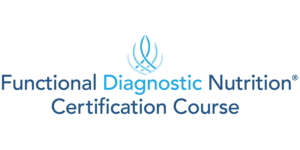
Functional Diagnostic Nutrition®
The Functional Diagnostic Nutrition® (FDN) Certification Course is 100% online. As stated in the FDN Course Curriculum Guide, available from the FDN website, this program provides training in functional lab assessments and client intake methods that produce individualized, targeted natural health building protocols. The goal of FDN is to build overall health and enhance performance within the hormone, immune, digestive, detoxification, energy production, and nervous systems.
The course is self-paced and students are given 12 months to complete it, but being completely self-paced it can be completed in as little as three or four months. Delivery is via video lectures, recorded “intake sessions,” recorded “results and recommendations” consults, case studies, and lecture notes. Each student experiences being an FDN client by being allocated a mentor, who in private consultations guides them through understanding their own personal lab test results and designs for the student a complete custom healing and health-building protocol. In addition, the mentor and student will role-play in a practical exercise with two “mock up” clients. Also included in the course are practitioner files and weekly live calls with FDN staff, as well as access to FDN support forums.
Certification, and the title of FDN Practitioner, is awarded to students who successfully complete all lessons, their personal testing, and the practical exercises, as well as pass the mid-term exam and the final exams (one written and one practical). Free lifetime access to updated course materials, practitioner files, and to the weekly calls is extended to all active FDN Practitioners.
Positive reviews abound for the FDN Certification Course. Graduates not only comment on the value for money, the depth of the material, the ongoing accessibility to updated lessons and tools, and the addition of new labs, but also on the often significant improvements to their own health and that of their clients.
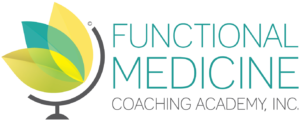
Functional Medicine Coaching Academy, Inc.
If you have either an associate degree, a certificate as a health coach or personal trainer, or have completed 200 hours of training as a yoga instructor, then you are eligible to apply for admission to Functional Medicine Coaching Academy (FMCA), Inc.’s 100% online 12-month health coach training program. Those who do not meet these requirements are able to petition for enrollment. According to FMCA’s website, this program is an intensive training in the art of coaching. Providing foundational knowledge of functional medicine, its purpose is to provide guidance and support as the student discovers their unique style of coaching: one that integrates functional medicine with personalized nutrition, the psychology of eating, mind-body medicine, and positive psychology.
The workload for this course is 7–10 hours per week. Material is mainly delivered via webinars and audio recordings, and assignments are worked on both individually and as part of a virtual team. The student views coaches in action, as well as engages in the coaching process, initially by working with a fellow student and then, halfway through the program, through a supervised 6-month practicum.
Those who have successfully completed all assignments, participated in all Skype or phone group supervision appointments, demonstrated competency to coach, and passed the final comprehensive exam earn the title of Functional Medicine Certified Health Coach.
Reviews are positive, with many graduates saying the program transformed their practices.
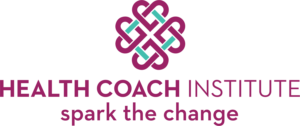
Health Coach Institute
The Health Coach Institute (HCI) offers the 6-month Become a Health Coach (BHC) Program. According to the BHC Course Catalogue, downloadable from the HCI website, the curriculum for this program is based on behavioral psychology, neuroscience, intuitive listening, habit change, and healthy lifestyle design. Covered in the course is nutrition, health and wellness education, transformational coaching skills training, personal growth, and business and marketing systems.
The workload for this course is 5–6 hours per week. It is 100% online and delivered via “bite-sized” video, audio, and printable transcripts. There are weekly skills labs, where students pair up and practice coaching each other; live bimonthly instructor-led group calls; and several coaching calls with an HCI Success Coach. Included are two done-for-you coaching programs with session-by-session outlines, coaching demos, templates, scripts, and cheat sheets. There are no examinations.
Reviews for this course vary widely, and the reason possibly comes down to personality type. The majority of past students appear to unreservedly love the program, with most speaking of it as having substantially enhanced their coaching and business skills. There are others, however, who report disliking the “cheerleaderish hype” and feel the done-for-you scripts forced them into being someone they are not. For this latter group, “It was just not who I am” was a common response.

Institute for Integrative Nutrition®
The Institute for Integrative Nutrition® (IIN) offers a one-year Health Coach Training Program that is 100% online. According to IIN’s Curriculum Guide, available on their website, this program emphasizes bio-individuality and teaches students how to create personalized nutrition and lifestyle protocols for each client by integrating nutrition, relationships, career, physical activity, and spirituality. Students learn coaching techniques and how to guide their clients through a 6-month health coaching program, as well as step-by-step business training. Included in the course is an introduction to 100 dietary theories, a basic overview of the anatomy and physiology of nutrition, and the basics of dysfunction such as inflammation, blood sugar imbalance, endocrine imbalance, and autoimmune disorders.
The workload for this course is 5–10 hours per week and is delivered via video lectures, live online classes, group discussions, and written assignments. Students can connect with each other and staff through online forums, a live web class, and scheduled group phone sessions. Practical experience is gained by pairing up with a fellow student, where they guide each other through a 6-month health coaching program. Graduates of IIN’s Health Coach Training Program earn the title of Integrative Nutrition Health Coach.
Reviews of this training program vary depending on what the individual is looking for in a course. Where this course seems to shine is on coaching techniques, business skills, and student support. Graduates state that it is a complete program for those wanting to help clients through diet and lifestyle changes; it may not be for those seeking a deeper understanding of nutrition science and health diagnostics.

Institute for the Psychology of Eating
The Institute for the Psychology of Eating offers an 8-month 100% online Eating Psychology Coach Certification Training course. As stated on their website, this program is a blend of eating psychology, holistic nutrition, mind-body science, coaching skills, body-centered practices, cultural studies, transformational disciplines, business development, and results-driven protocols. Covered in depth are the major eating challenges—weight, body image, overeating, binge-eating, and chronic dieting—as well as common nutrition-linked health problems such as digestive issues, fatigue, immune challenges, and mood concerns. Students are taught tools and strategies to coach their clients to transform their relationship with food.
The workload for this program is 6–8 hours per week. The course is delivered via video, audio, and downloadable handouts, and there are recommended readings, as well as multiple choice tests to be completed by specific dates. In addition, there are two live teleclasses each month, and an optional peer-coaching program, where students are paired up and meet monthly to practice coaching techniques. Students also have access to an online forum. At the end of the course there is a final multiple-choice exam. Students who complete the training become certified as an Eating Psychology Coach.
Reviews for this course are largely positive. Graduates speak of the training as being transformative on both a personal and professional level. Many report that not only have they learned to love themselves and their body and develop a healthier relationship with food, but they also have the tools and confidence to help others learn to do so too.

Institute for Transformational Nutrition
The Institute for Transformational Nutrition (ITN) offers a 100% online 8-month Transformational Nutrition Coach certification program. This program places equal emphasis on science, psychology, spirituality, business, and coaching. According to the ITN Getting Started Guide available on the ITN website, the science component covers macronutrients, vitamins, minerals, supplements, biochemistry, anatomy and physiology, body systems, foods and dietary systems, detoxing, digestion, food intolerances, life stage health and lifestyle enhancement, health conditions and disease, holistic health, and alternative medicines; the psychology component covers emotional eating, eating disorders and food addiction, obesity and body image, stress eating and mindful eating, and self-care; and the spiritual component covers spiritual awakening and connection, spiritual nutrition, and spiritual rituals.
Methods and techniques learned include biochemistry balancing, identifying psychological triggers, using aromatherapy, blending herbal treatments, and integrating NLP for coaching. Included in the course are two pre-packaged programs to use with clients. These include scripts, marketing and presentation materials, meal plans, handouts, and supplement recommendations. In addition, students and graduates have access to ongoing one-on-one support as well as life-long access to the private ITN Facebook community and continued course updates.
The workload for this course is 5–10 hours per week, and it is delivered via videos, audio recordings, checklists, workbooks, coaching, and recommended reading lists. There are multiple-choice tests as well as skills-lab assignments, where students can pair up with another ITN student, a friend, or family member to practice the techniques learned. There is no final exam; however, those who have earned the title of Transformational Nutrition Coach are eligible to sit for the NANP Board Exam in Holistic Nutrition.
Graduates state that the course’s strength lies in its breadth of material, but many say it is lacking in depth.
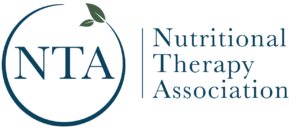
Nutritional Therapy Association, Inc.®
The Nutritional Therapy Association, Inc.® (NTA) offers two 9-month training programs: the Nutritional Therapy Practitioner Program™ (NTP) and the Nutritional Therapy Consultant Program™ (NTC). While these courses are primarily online, they do include mandatory in-person workshops—one 3-day workshop for NTC, and three workshops (10 days in total) for NTP. According to the NTA’s Course Catalog, downloadable from their website, the only difference between these two programs is that NTP includes additional training in hands-on functional evaluation and lingual-neural testing. The NTC program is for those who already use other modalities to evaluate the body.
NTA’s philosophy with regard to diet is based on the teachings of Dr Weston A Price and Dr Francis M Pottenger Jr, and the concept of bio-individuality. Students learn how to address nutrient deficiencies and body imbalances through holistic nutrition. Included in the course is anatomy and physiology, and the use of dietary suggestions and supplementation protocols to support physiological function, improve nutritional status, and bring balance to body systems. Emphasis is placed on digestion, blood sugar balance, mineral balance, fatty acid balance, hydration, and a nutrient-dense diet. Also included is training on the client consultation process and business basics.
The workload for these courses is approximately 15–20 hours per week. The online components are delivered via video and audio lectures, conference calls, and online interaction with the instruction team. Students have access to online forums and can also schedule individual phone conferences with instructors. To become certified as a Nutritional Therapy Consultant or Nutritional Therapy Practitioner, students must complete all homework and pass the midterm and final exams (written exams for NTC, and both written and practical exams for NTP). Those who have completed the NTC program can later take the Functional Assessment Development program to gain NTP certification.
Reviews of both these training programs are positive, with graduates stating that the courses are not only comprehensive—providing a deep understanding of nutrition physiology—but also enjoyable.

Precision Nutrition
The Precision Nutrition (PN) Certification program is 100% online and completely self-paced. It includes two main components—the science of nutrition, and the art of coaching. The course is targeted towards personal trainers and fitness coaches but is open to anyone.
Students are shipped a comprehensive 500-page textbook, which is divided into two parts: (1) nutritional science and (2) nutritional practice. Incorporated throughout the text are case studies, and also provided are forms and questionnaires that can be used with clients. To complement the text, there is a workbook, online video slides, further reading materials, and quizzes. There is also an active student forum with input and instruction from the PN staff. Students take the final online multiple-choice exam whenever they want. A second level of the program guides students through a coaching internship.
Reviews for the PN Certification program are mixed. Some students praise the comprehensive and detailed text as well as the thorough and systematic approach to behavioral change; however, others are disappointed by the fact that the video component is merely the presenter reading various extracts from the text book. This latter group felt the course would be improved with interactive classes.
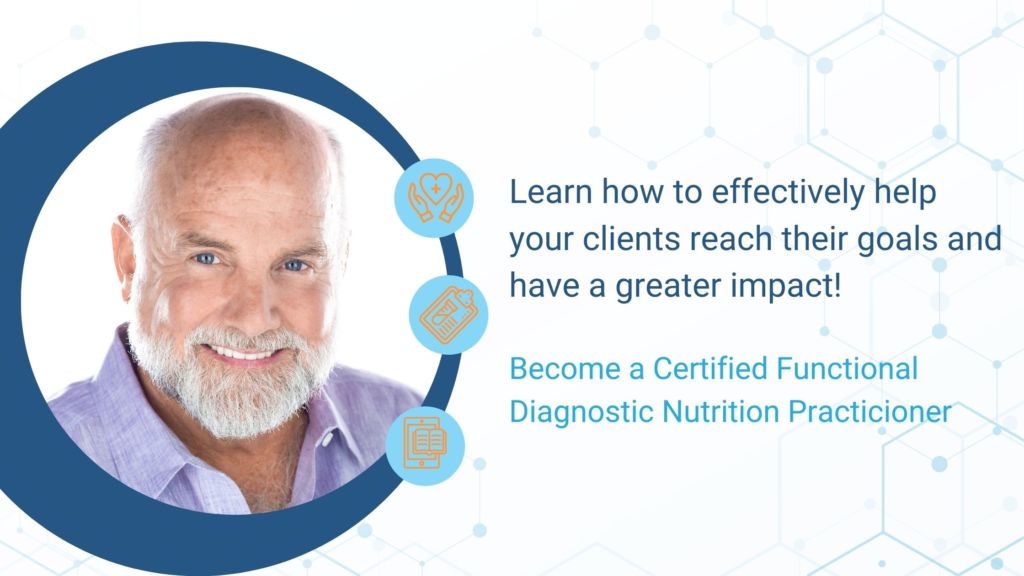
Conclusion
Finding the right training to match your personal aspirations is key to your success as a Health Coach.
Looking to Get Real Results for Your Clients?
